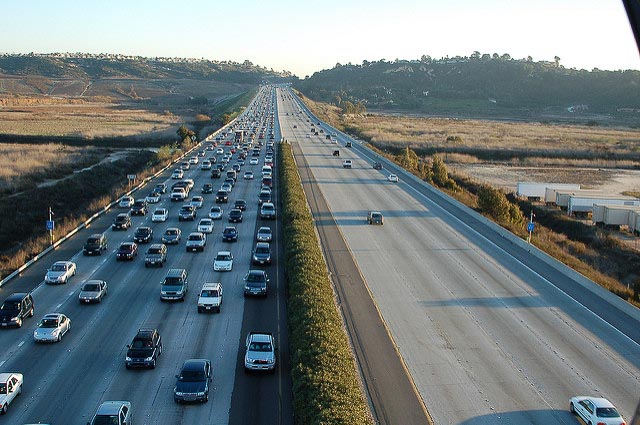While the Urban Edge strives to provide readers with daily news and insights about urban policy, we’re also voracious readers of city news ourselves. As part of a weekly feature, senior editor Ryan Holeywell highlights the week’s most interesting articles from around the web about urban policy and city life.
Stuck in Traffic, Polluting the Inside of Our Cars
New environmental research suggests that sitting in traffic exposes us to more pollutants than we previously thought, the New York Times reports. A newly study by British researchers reveals that "pollution levels inside cars at red lights or in traffic jams are up to 40 percent higher than when traffic is moving." The scientists based their data on measurements taken from inside a car as it traveled a loop and passed through 10 intersections.
It’s Easy to Become Obese in America. These 7 Charts Explain Why.
The CDC finds that the average American man weighs 15 pounds more than he did 20 years ago, Vox reports. But that probably shouldn't come as a surprise. The news outlet uses charts to show the amount of money Americans spend on food; the growth of portion sizes; and the high cost of healthy foods, among other factors, that have likely contributed to the trend.
What More Than 1 Million Craigslist Rental Listings Tell Us About the Housing Market
Craigslist could offer a trove of data about the housing market, but its data isn't exactly organized, given the bare-bone, homemade nature of its rental listings. But Berkeley researchers figured out how to scrape millions of rental listings from Craigslist in 2014 and were able to identify important trends, the Washington Post's Wonkblog reports. In particular, researchers highlight the wide disparity of rental costs between markets. In the Bay Area, for example, "there are hardly any units available at the per-square-foot prices that cover most of the Atlanta-area market."
Big Data and Hidden Cameras are Emerging as Dangerous Weapons in the Gentrification Wars
Landlords are using services from data analytics firms that scour social media to determine whether a potential tenant may be risky, Quartz reports. Landlords are also using hidden cameras in rent-controlled buildings to determine whether a tenant is really using it as his primary residence (which is required)."Many low-income people living in housing projects already know that surveillance can control their access to housing," Quartz writes. "Now, renters everywhere should be prepared to be subject to such treatment as gentrification continues to increase."
How Academia is Failing Government
Governments don't get enough help from academics, who should be developing ideas to improve policy and management, Governing writes. That's because many universities measure a professor's "impact" by the number of journal citations he or she has received -- a measure that rarely correlates with impact in the real-world. "If we truly want our research to matter," the magazine writes, "we as academics must be willing to embrace measures that are focused on actual policy and practical management concerns rather than continuing to reward ourselves for talking to each other." Editor's note: we agree. That's why the Kinder Institute publishes this blog, hosts public forums, and focuses on "translational" research.

